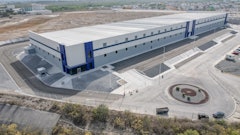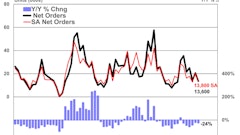Mr. Daniel Cline, President of KC Windustrial Company, and I were discussing the wild price swings of materials and how contractors should adjust to them.
KC Windustrial has been distributing plumbing parts and supplies to Kansas City area contractors since 1981. Dan has been with the company since the beginning and has seen it all.
Dan made some interesting observations from the supplier point of view that I thought would be worth your time. I have added a few additional observations at the end of Dan's comments.
Here is what Dan had to say about the impact rapidly changing material prices has had on contractors.
"In the last several years we have seen a huge increase in the amount of material that is being bought and stored by our customers. In the past this was common only for fixtures on large jobs that were finished in phases over a long period. Today we see it on most fixture jobs and a lot of rough material (pipe, valves and fittings).
"The high amount of volatility in the metals market is mostly driving the rough material purchases. This is about the only way contractors can protect themselves from large increases in rough material costs.
"When we bid a job to a contractor the fixture prices are only guaranteed until the next manufacturer price increase or the expiration of their job quote. In years past this was not much of a problem because the manufacturer's price usually only increased once a year and then usually by less than 5%.
"Often we could get the price protected until the end of the job if it were within six months of the next increase. Today, because of the larger fuel and metal price volatility most will not hold pricing past the next increase.
"Our policy has always been to try to get the material scheduled to arrive about 30 days before the fixtures are needed. This gave us a bit of a buffer to make sure we were covered for any unforeseen shipping errors and we would deliver when the material was called for by the contractor. This is still how most jobs are handled that have a completion date of less than a year.
This does not work however if the manufacturers quote expires ahead of when we would normally deliver the material. Then the contractor must decide to pay the increase or order now and store here or on the job.
"Material storage at our location solves several costly problems for the contractor. If all the material hits the job site, the job site becomes congested causing more cost in labor. The material has to be secured from damage, theft etc at the job site: The more hands that touch the material the more likely damage may occur.
In a nutshell there are far more benefits than detriments to a bill and hold arrangement."
To give you an appreciation for the gyrating price of materials, let's take a look at copper's behavior over the past 18 months.
Jan 10, 2006 $1.50 per pound
July 10, 2006 $2.90 per pound
Jan 10, 2007 $2.55 per pound
July 10, 2007 $3.61 per pound
Copper went up 93% in the first six months.
Copper dropped 12% in the next six months.
Copper went up 41% in the following six months.
Who knows where it will be in another six months?
Think about what Dan said. In the past, manufacturers might raise their price once a year and by not more than 5%. For the time being, that day is gone. The current price swings force you to adjust your material purchasing and bidding strategy.
When there is going to be a significant time lag between bid and shop drawing approval, building owners should bear the brunt of the material cost increases.
A 10% increase in material price can wipe out most of a contractor's profit if he has to swallow the increase.
Why should a building owner receive a break on the price of his project just because he drug out the contract completion or his chosen design team is too busy to turn the shop drawings around within a reasonable time?
Or better yet, what about trades that can't buy their material and store it ahead of time (pavers, for example).
You need to work price increase clauses into your contracts. Price escalation clauses are justified in today's economy. Assuming you are allowed to bill for legitimately stored materials, buy your materials as quickly as you can to lock in your estimated prices.
Ron Roberts, The Contractor's Business Coach, teaches contractors how to turn their business into a profit spewing machine. To receive Ron's FREE Contractor Best Practices Newsletter visit www.FilthyRichContractor.com.


























